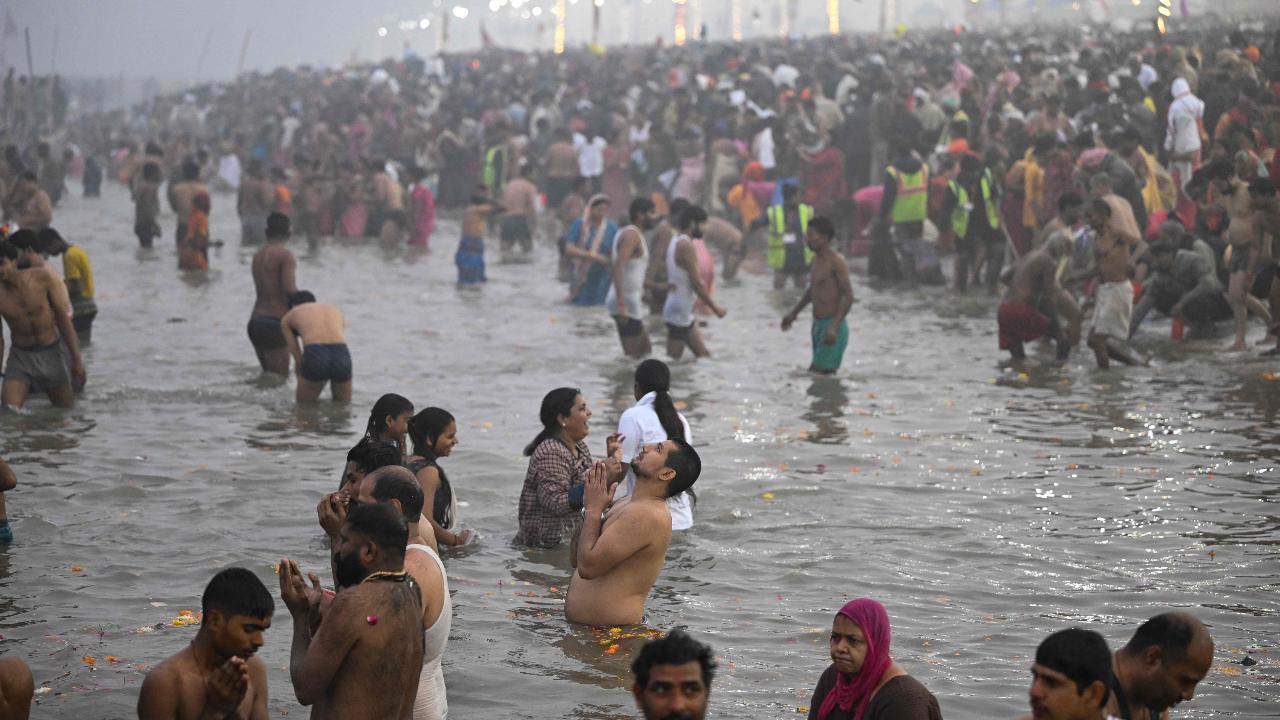The report also highlighted that the river water quality failed to meet the primary water quality standards for bathing concerning Fecal Coliform (FC) at all monitored locations on various occasions

The Maha Kumbh started on January 13 and is set to get over on February 26. Photo Courtesy: PTI
In a recent report, the Central Pollution Control Board (CPCB) informed the National Green Tribunal (NGT) about the water quality of rivers with respect to Biochemical Oxygen Demand (BOD). The report stated that during monitoring conducted on January 12-13 in 2025, the river water quality did not meet the bathing criteria at most locations.
However, after this period, organic pollution (in terms of BOD) began to decrease due to the intrusion of freshwater at upstream locations. By January 13, 2025, the river water quality met the bathing criteria concerning BOD, except for the area around the Lord Curzon Bridge on the Ganga River on January 19, 2025.
The report also highlighted that the river water quality failed to meet the primary water quality standards for bathing concerning Fecal Coliform (FC) at all monitored locations on various occasions. The significant number of people bathing in the river at Prayagraj during the Maha Kumbh Mela, especially on auspicious bathing days, led to an increase in faecal concentration.
The report further stated that seven Geosynthetic Dewatering Tubes (geo-tube) filtration sites were operational at Prayagraj. A team from the CPCB visited all seven sites from January 6-8, 2025, to verify the installation status and again on January 18-19, 2025, for treatment verification.
Twenty-one drains were tapped and treated under the geo-tube system.
All seven geo-tubes were monitored, and samples were collected and analysed at the CPCB Regional Directorate (RD) Laboratory in Lucknow. According to the sample analysis results, all were found to be non-compliant with the prescribed norms as prescribed in the 55th Executive Committee meeting of the National Mission for Clean Ganga (NMCG) under the agenda.
On Monday, the Tribunal bench led by Justice Prakash Shrivastava noted that upon reviewing the documents enclosed with the covering letter dated January 28, 2025, from the in-charge of the Central Laboratory, UP PCB, high levels of faecal and total coliform were found at various locations.
The counsel for the State of UP requested one day to examine the reports and file a response. The tribunal directed the Member Secretary of UP PCB and the concerned State Authority responsible for maintaining the water quality in the Ganga River at Prayagraj to appear virtually on the next hearing date. The case has been listed for February 19, 2025, said the bench.
The Tribunal was considering grievances about the quality of water in the Ganga and Yamuna rivers in Prayagraj and examining allegations of untreated sewage discharge into these rivers, particularly concerning the Magh Mela and Kumbh Mela.
To ensure better monitoring and prevent the unwanted flow of untreated sewage into the Ganga and Yamuna rivers during the Maha Kumbh, the Tribunal directed the CPCB and Uttar Pradesh Pollution Control Board (UPPCB) to increase their monitoring points and the frequency of monitoring. This measure aims to protect pilgrims who come for holy baths from suffering due to water contamination.
The CPCB and UPPCB were instructed to take water samples from the Ganga and Yamuna rivers at least twice a week at regular intervals while avoiding duplicating samples on the same day. The sample analysis reports are to be displayed on the UPPCB and CPCB websites. Additionally, the report will include the performance of Sewage Treatment Plants (STPs) and geo-tubes.
This story has been sourced from a third party syndicated feed, agencies. Mid-day accepts no responsibility or liability for its dependability, trustworthiness, reliability and data of the text. Mid-day management/mid-day.com reserves the sole right to alter, delete or remove (without notice) the content in its absolute discretion for any reason whatsoever.
 Subscribe today by clicking the link and stay updated with the latest news!" Click here!
Subscribe today by clicking the link and stay updated with the latest news!" Click here!








